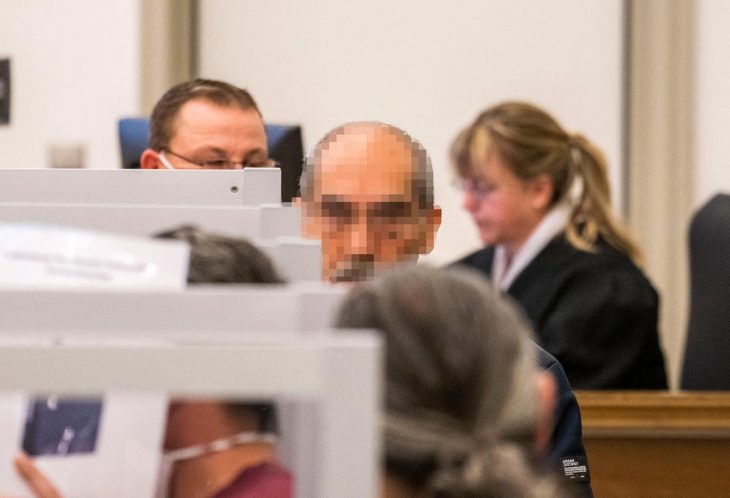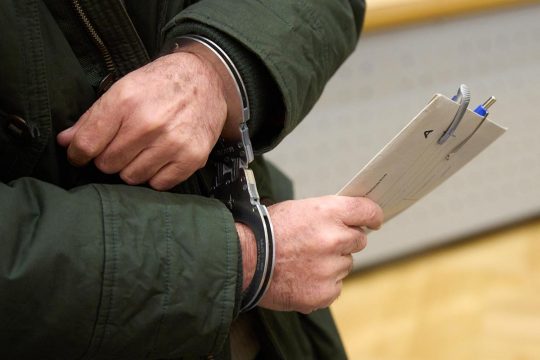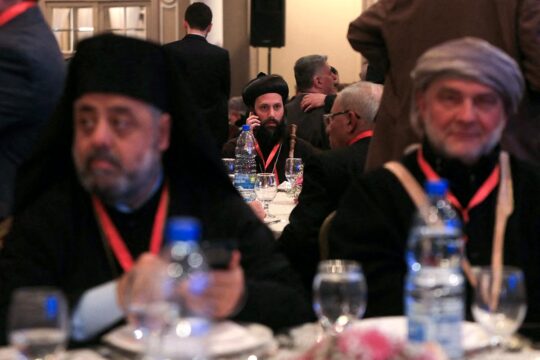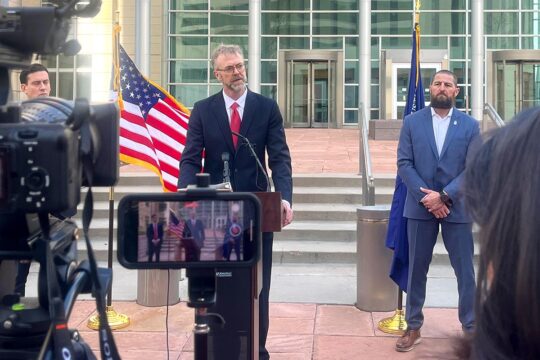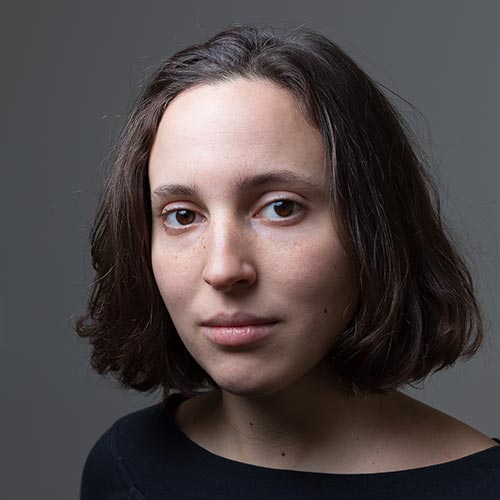There is one thing everyone in the courtroom agreed on after nearly two years of trial – prosecution, plaintiffs and judges, even the defendant and his lawyers: the Bashar al-Assad regime committed heinous crimes against its own population. They also agreed that thousands of prisoners were tortured and killed in secret service branches all over Syria, including branch 251 in its capital Damascus, where colonel Anwar Raslan was head of investigations until mid-2012. What they do not agree on, however, is the role played by Raslan. According to the indictment, 58 killings and 4.000 cases of torture happened under his watch. According to the defence, he is innocent.
If anything, they say, he helped as many prisoners as he could.
A week before the final verdict in the al-Khatib trial in Koblenz, the defence gave its closing arguments. Since April 2020, two former secret service officers from Syria had been accused of crimes against humanity for their contribution to the abuse and killing of prisoners in an infamous state security prison often referred to as “al-Khatib” after the area it is located in. The lower-ranking officer Eyad al-Gharib was sentenced to four and a half years in prison last February. Now, after 103 days of evidence collection, the trial against Raslan, the main accused, is about to come to an end.
Following the statements by the prosecution and joint plaintiffs, wo pleaded for a life sentence, the last word was given to the defence, last Thursday.
“This is not a political trial”
Both Raslan’s lawyers were careful to emphasize that they were not there to defend the Assad regime. “The question is whether Raslan can be held accountable as a representative of the Assad regime and punished with the highest sentence”, said attorney Yorck Fratzky, arguing that international law needed to be very careful when judging individual responsibility within a criminal, totalitarian system. “We have to apply a different standard than we do with crimes committed in a constitutional state like Germany”, he said, adding that for this reason international tribunals usually focused on the highest ranking political and military leaders, who organized the crimes, even if they did not execute them personally. “It is Anwar Raslan sitting in the dock. I cannot see Bashar al-Assad there nor can I see Hafez Makhlouf [al-Assad’s cousin and former head of branch 251’s subdivision number 40]“, Fratzky declared. And even if he had had authority, he said, he had acted under duress.
But he didn’t, according to the defence. They recounted Raslan’s initial statement in which he explained how he lost all authority in the branch, after he had released too many prisoners and questioned the regime’s violent reaction to protests more than once. “Mister Raslan never denied knowing about torture, but he has explained that he did whatever he could to help”, added Fratzky. Looking back at the many testimonies heard at the trial, he divided the survivor witnesses into three groups: those who had met Raslan and had been treated well by him; those who thought they had met him, but could not identify him with certainty; and those who heard about his name and position later and merely assumed that he had to have been the one in charge of their abuse.
“Most of them had one thing in common: they cared about Syria, not about Raslan. They found a platform here to criticize the regime. Some needed the trial to process what they had suffered and find closure”, said Fratzky. Even though he understood the victims’ urge to get the defendant convicted, because he had worked for the hated Assad regime, “this is not a political trial, but a criminal procedure.”
Caesar photos: “Irrelevant to this trial”
Fratzky’s colleague Michael Böcker sought to highlight, in his speech, that throughout the trial all the information Raslan had given about his person and position in Syria had not been disproven: the way he risked his life by speaking out more than once against the arbitrary mass arrests, the way he kept releasing innocent detainees; and the way his situation as a Sunni Muslim working for an Alawite regime became more and more dangerous. No evidence was given for speculations about him defecting for opportunistic reasons or remaining a spy for the regime. Neither had the allegations been confirmed that he only helped prisoners who were famous artists or intellectuals. Then, “how about the simple assumption that he helped people as many people as he could and that these were just some highlights among many others?”, asked Böcker. According to the maxim “innocent until proven guilty” this should have been the most obvious conclusion, he argued.
Böcker expressed his disappointment with many of the witnesses and evidence presented. Expert witnesses as well as witnesses from the asylum authorities or police offices had remained vague and general in their testimonies. “Raslan did his part by giving a statement, and the government offices should have done the same, but they were disappointing. They were of no use to us, but they also did not cause any harm.” The Caesar photos, while shocking, had proven nothing about his client’s personal involvement. “They show a great deal about the Syrian system, but they are of no relevance for this trial”, he said. “They do not concern the al-Khatib prison during the time frame of the indictment.”
“I was convinced that I had to defect”
Finally, it was Raslan’s own turn to speak. Those following the trial had hoped to finally hear him speak and see some emotion in his face or hear it in his voice. However, the defendant’s final words had been pre-translated to German and were read out by his personal translator. “In my final words, I do not just want to focus on my defence, but also on the truth”, he said, giving rise to hopes that he would reveal inside information or take responsibility of the crimes, as the plaintiffs had urged him to do in their final statements. But much of Raslan’s one hour speech merely repeated what he had said in his initial statement in May 2020.
He talked about the mass arrests that started in March 2011 and how the branch’s prison was flooded by prisoners “like a tsunami”. “At first, I tried to keep the numbers low, because the prison was not designed for such a large number”, he said, once again displaying his more pragmatic than compassionate way of looking at things. He said he wrote daily protocols in which he suggested that most of the detainees be released, especially those who had been unarmed. He described several situations where that gotten him into trouble. At the same time, he said, he became suspicious to his superiors, because he was a Sunni Muslim from the opposition stronghold of al-Hawla. In spring 2011, his boss Tawfiq Younis called him. “He said that 50.000 people from my hometown had protested and that they were traitors. After analysing the situation, I realized that he saw me as a traitor, as well, and I was convinced that I had to defect”, explained Raslan.
“I was not able to stop the killing machinery”
According to the former secret service officer, it took him until the end of 2012 to prepare his safe departure together with his family. During these long months he claims to have risked his life by helping as many prisoners as he could, while increasingly losing the trust of his superiors. Another episode he recounted happened in May 2012, when the pro-regime militias committed a massacre against the population of Raslan’s hometown, killing more than a hundred civilians. Once again, Raslan was called into Younis’ office where he encountered a Russian television crew. “They wanted me to give an interview and say that Islamists were responsible for the massacre”, said the defendant. When he refused, his boss had said to him: “Now all your cards are on the table, and they are all losing cards. Go back to your office.” Soon after, Raslan was transferred to a different branch, from where he eventually defected.
While Raslan did acknowledge that prisoners arrived in the branch with injuries, were tortured there or even killed, he blamed someone else for each of those events: officers from other branches, his superiors, or the notorious Makhlouf, powerful and cruel cousin of al-Assad. And while he did apologize to the families of the victims, it was not for committing crimes, but for “not being able to help more than I did, not being able to stop the killing machinery.”
Finally, he said he was approaching his 60th birthday and was suffering a lot from a chronic disease, from the displacement from his homeland and from the separation from his children and grandchildren. He asked the court for a fair verdict, stressing that he believed in the German law and judiciary, and that he would accept whatever it will decide.


